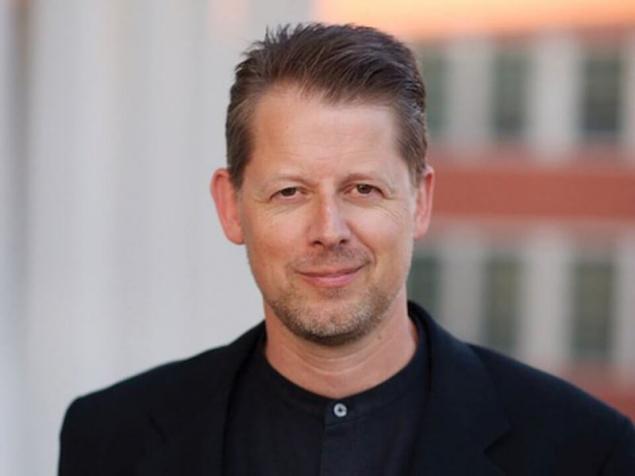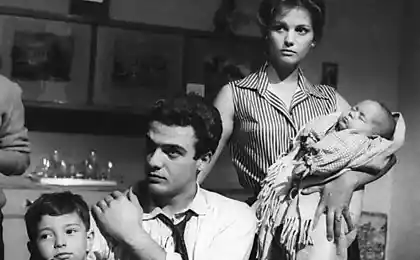470
Princeton Professor Andrew Moravcsik: Why I sacrificed my career for his wife
The future of children, women and the happiness of men depends on whether there are fathers who take on the family business, says Princeton Professor Andrew Moravcsik. Here is his acclaimed text published recently in The Atlantic.
Three years ago my wife Anne-Marie slaughter has written about how difficult it is for women to "have it all" — family and career. She recently left a high post in Washington and returned home to Princeton, where I acted as the main parent for our children. Paradoxically, her article about how difficult it is to find a middle ground between work and personal life, brought her fame on a national scale, and I'm even more focused on the education of our sons — what do you do now.
This is the second part of our family history.

Anne-Marie and I went to University at a time when the number of female graduates ahead of men and women began to be more successful. I never doubted that my wife no less, and even more serious prospects than me. And she is too.
We decided together to have children: or to equally share responsibilities or take turns to play the role of primary parent. At first it was impossible, including due to conditions of our work. When our kids were born, we were both teaching at Harvard, and then moved to Princeton. It's like a little Scandinavia in the U.S., the conditions that most Americans can only dream of: leave to care for the child and for mother and for father, flexible schedule, great vacation, long-term stability. We had enough money to afford a good kindergarten, and then when the kids went to school — the housekeeper.
When I finished my vacation on the occasion of the birth of her second son, I went back to work and thought my career path in particular will not change. I planned that I will have enough time for children, if I'm going to work more effectively in the office. We had hoped that we would help each other in case of hard deadlines and to allocate children more time.
While our boys were very young, it worked. But then we ran into the obstacles faced by other families, where both parents make a career. First, career is still different. The work of Anne-Marie and Harvard, and Princeton was one that required more than mine because she started to build a career in the administrative line. She became a Dean at Princeton, then took a high position in the state Department, and then led a large non-profit organization.
Second, when children became older, new problems arose. Take care of the baby physically difficult, but it is often allowed to escape from the working routine. But teenagers have other problems. School and extracurricular activities can eat all the time. Some children lose control. Our oldest son got into bad company, abandoned the lessons, misbehaved at school and could not cope with mathematics, and even argued with me and basically wouldn't listen to me. A year later he was expelled from school, and he was in the police station. He needed a lot of support and advice, but now he stood up in a positive way. In a few years our youngest son also entered this difficult age. He was less of a problem, but it also required a lot of parental involvement.
In such a situation, sooner or later one of the parents assumes the primary role. In our family the kind of parent I've become. Of course, Anne-Marie actively worked with children and took on responsibility for certain aspects of their lives — the interaction with teachers, visits to the College. She's emotionally intimate with both of our children. And as Anne-Marie wrote three years ago, she refused to work in government to help our older teenage son overcome difficulties.
But still it is not the main part of the parent work. The main thing — every day to be on the front line. I was getting the kids ready in the morning and sent to bed in the evening watched how much time they spend on the computer and TV, trying to ensure that homework was done correctly, supported their sports and music, went to baseball games, piano lessons, school plays and concerts, and followed their social life. Still my name stands first in the list of contacts in case of emergency, and that I throw everything in the event of a crisis. These tasks by themselves is not that very difficult, and my list is much shorter than the parents who can't afford a housekeeper. But it inevitably had an impact on my work productivity.
However, there was no doubt that this role will fall to me. Responsibilities Anne-Marie this is not allowed: when the TV station requests an interview, the CEO shall call a meeting of the Board of Directors or the Secretary of state asks for advice, you can not come. For many years Anne-Marie had time for dinner no more than twice a week.
In most families, all these responsibilities fall on women. And it is devastating affects on their career. The gap between the salaries of men and women called "motherhood penalty" because it is almost entirely due to lower earnings and status of women with children.
Despite the more outstanding achievements at the University, few women reach the peak of professional success: women are only 21% among surgeons, 20% of law firm partners and 9% of hedge Fund managers.The classic response to this problem is to ask for more men to help around the house. But we need not "aid": men too should take a leading role. And for most of them it will not be easy. Should change rules and expectations at work, or fathers in this role will carry an unacceptable occupational hazard. Over the last ten years the quality and quantity of my research is markedly affected. But I'm still a Professor at a leading University. In most professions for me, this would be impossible. Sociological studies show that although young men want to be married to their role and their spouses were equal, the lack of interest of employers to such a scenario forces them to occupy traditional gender roles when they have children.
And even when the employer supports the care of the fathers on the children, those faced with less visible psychological, cultural and social obstacles. Studies show that in many cases they are marginalized when making use of such opportunities. The idea that the man will play a leading role in taking care of the children, for many people deeply uncomfortable. Nothing kills a conversation over dinner, as a casual remark that his wife earns more than me. 42% of Americans believe the ideal family is one in which the father has full employment, and the mother is partial; nearly half prefer that the woman does not work. Only 8% believe that children do better when father is at home.
Cultural barriers with age, only increase. If the father in twenty or thirty-something years, takes a vacation or time off to care for an infant, it sounds delicious.
But if you are over 40 or over 50 and you limit your work schedule and ambitions to devote more time to children-adolescents, is suspicious — even the women. Of course, when it is possible to break the stereotypes, this is nice. During one trip to China I shook to the depths of corporate chiefs and their wives who were traveling with us in the same bus, at first I was talking with top management about the fate of the Euro, and then turned to the women and began to discuss with them in which store is better to buy the sheets. But it is possible so to scoff at stereotypes, you need to have a certain professional reputation (like one that gives a professorship at an elite University).
In addition, men taking care of children brings loneliness. In the upbringing of children is extremely important in the parent network, which transmit key information on good and bad teachers, extracurricular activities, summer camps and so on. In such networks is dominated by women is a significant social activity. At school assemblies they're gossiping and making plans — I get the laptop and try to do their work. One lawyer from San Francisco who is actively involved in raising her daughter, said: "Mom at best tolerate you, and at worst is rejected". So if you are a father, who plans to take a leading role in the care of children, first look for other such fathers. You will need them.
Finally, this role can inspire a feeling of its inadequacy. The combination of career and childcare leaves in me the feeling that I can't deal with that, and with others. Although there is nothing surprising. If I read what you write about your life as a working mother, I would know: "I am so bad at" is the real mantra. But I think for men it can be even harder, because we are taught from childhood that we need to control the situation. Loss of control weakens. But if you have no sense that things are constantly getting out of control, you are the chief in the family a parent, you just help.
So why all this?
First, it is good for a marriage. I am passionate about research and appreciate professional success. But Anne-Marie is charged by competition and more motivated than I am. I am proud of its achievements, and the balance of which we found makes us happier.
Secondly, this is something special for children. I think my sons had learned a lot due to the fact that I was at home, and not just because they have someone to take care of. One of my former colleague from Harvard proves that men are biologically unfit to care for children, but I think that the opposite is true. In my experience, fathers bring to parenting your approach — practical, project-oriented, discipline, combined with the desire for something interesting.
Third, and most importantly — a more equitable distribution of household responsibilities makes life more diverse and meaningful.Surveys show that men are less, and even more torn between work and home than women. And those and others trapped in a system that offers them only one-sided role. And assuming the main role in the family, men can achieve a very close relationship with the children. Despite all the difficulties, I would never want to live those years differently. I feel proud that in many ways stronger professional. At the end of life greatest regret of many men — that they devote their life to the career that was expected from their society. I kind of regret not threatened.published
P. S. And remember, just changing your mind — together we change the world! © Join us at Facebook , Vkontakte, Odnoklassniki
Source: ideanomics.ru/?p=4784
Three years ago my wife Anne-Marie slaughter has written about how difficult it is for women to "have it all" — family and career. She recently left a high post in Washington and returned home to Princeton, where I acted as the main parent for our children. Paradoxically, her article about how difficult it is to find a middle ground between work and personal life, brought her fame on a national scale, and I'm even more focused on the education of our sons — what do you do now.
This is the second part of our family history.

Anne-Marie and I went to University at a time when the number of female graduates ahead of men and women began to be more successful. I never doubted that my wife no less, and even more serious prospects than me. And she is too.
We decided together to have children: or to equally share responsibilities or take turns to play the role of primary parent. At first it was impossible, including due to conditions of our work. When our kids were born, we were both teaching at Harvard, and then moved to Princeton. It's like a little Scandinavia in the U.S., the conditions that most Americans can only dream of: leave to care for the child and for mother and for father, flexible schedule, great vacation, long-term stability. We had enough money to afford a good kindergarten, and then when the kids went to school — the housekeeper.
When I finished my vacation on the occasion of the birth of her second son, I went back to work and thought my career path in particular will not change. I planned that I will have enough time for children, if I'm going to work more effectively in the office. We had hoped that we would help each other in case of hard deadlines and to allocate children more time.
While our boys were very young, it worked. But then we ran into the obstacles faced by other families, where both parents make a career. First, career is still different. The work of Anne-Marie and Harvard, and Princeton was one that required more than mine because she started to build a career in the administrative line. She became a Dean at Princeton, then took a high position in the state Department, and then led a large non-profit organization.
Second, when children became older, new problems arose. Take care of the baby physically difficult, but it is often allowed to escape from the working routine. But teenagers have other problems. School and extracurricular activities can eat all the time. Some children lose control. Our oldest son got into bad company, abandoned the lessons, misbehaved at school and could not cope with mathematics, and even argued with me and basically wouldn't listen to me. A year later he was expelled from school, and he was in the police station. He needed a lot of support and advice, but now he stood up in a positive way. In a few years our youngest son also entered this difficult age. He was less of a problem, but it also required a lot of parental involvement.
In such a situation, sooner or later one of the parents assumes the primary role. In our family the kind of parent I've become. Of course, Anne-Marie actively worked with children and took on responsibility for certain aspects of their lives — the interaction with teachers, visits to the College. She's emotionally intimate with both of our children. And as Anne-Marie wrote three years ago, she refused to work in government to help our older teenage son overcome difficulties.
But still it is not the main part of the parent work. The main thing — every day to be on the front line. I was getting the kids ready in the morning and sent to bed in the evening watched how much time they spend on the computer and TV, trying to ensure that homework was done correctly, supported their sports and music, went to baseball games, piano lessons, school plays and concerts, and followed their social life. Still my name stands first in the list of contacts in case of emergency, and that I throw everything in the event of a crisis. These tasks by themselves is not that very difficult, and my list is much shorter than the parents who can't afford a housekeeper. But it inevitably had an impact on my work productivity.
However, there was no doubt that this role will fall to me. Responsibilities Anne-Marie this is not allowed: when the TV station requests an interview, the CEO shall call a meeting of the Board of Directors or the Secretary of state asks for advice, you can not come. For many years Anne-Marie had time for dinner no more than twice a week.
In most families, all these responsibilities fall on women. And it is devastating affects on their career. The gap between the salaries of men and women called "motherhood penalty" because it is almost entirely due to lower earnings and status of women with children.
Despite the more outstanding achievements at the University, few women reach the peak of professional success: women are only 21% among surgeons, 20% of law firm partners and 9% of hedge Fund managers.The classic response to this problem is to ask for more men to help around the house. But we need not "aid": men too should take a leading role. And for most of them it will not be easy. Should change rules and expectations at work, or fathers in this role will carry an unacceptable occupational hazard. Over the last ten years the quality and quantity of my research is markedly affected. But I'm still a Professor at a leading University. In most professions for me, this would be impossible. Sociological studies show that although young men want to be married to their role and their spouses were equal, the lack of interest of employers to such a scenario forces them to occupy traditional gender roles when they have children.
And even when the employer supports the care of the fathers on the children, those faced with less visible psychological, cultural and social obstacles. Studies show that in many cases they are marginalized when making use of such opportunities. The idea that the man will play a leading role in taking care of the children, for many people deeply uncomfortable. Nothing kills a conversation over dinner, as a casual remark that his wife earns more than me. 42% of Americans believe the ideal family is one in which the father has full employment, and the mother is partial; nearly half prefer that the woman does not work. Only 8% believe that children do better when father is at home.
Cultural barriers with age, only increase. If the father in twenty or thirty-something years, takes a vacation or time off to care for an infant, it sounds delicious.
But if you are over 40 or over 50 and you limit your work schedule and ambitions to devote more time to children-adolescents, is suspicious — even the women. Of course, when it is possible to break the stereotypes, this is nice. During one trip to China I shook to the depths of corporate chiefs and their wives who were traveling with us in the same bus, at first I was talking with top management about the fate of the Euro, and then turned to the women and began to discuss with them in which store is better to buy the sheets. But it is possible so to scoff at stereotypes, you need to have a certain professional reputation (like one that gives a professorship at an elite University).
In addition, men taking care of children brings loneliness. In the upbringing of children is extremely important in the parent network, which transmit key information on good and bad teachers, extracurricular activities, summer camps and so on. In such networks is dominated by women is a significant social activity. At school assemblies they're gossiping and making plans — I get the laptop and try to do their work. One lawyer from San Francisco who is actively involved in raising her daughter, said: "Mom at best tolerate you, and at worst is rejected". So if you are a father, who plans to take a leading role in the care of children, first look for other such fathers. You will need them.
Finally, this role can inspire a feeling of its inadequacy. The combination of career and childcare leaves in me the feeling that I can't deal with that, and with others. Although there is nothing surprising. If I read what you write about your life as a working mother, I would know: "I am so bad at" is the real mantra. But I think for men it can be even harder, because we are taught from childhood that we need to control the situation. Loss of control weakens. But if you have no sense that things are constantly getting out of control, you are the chief in the family a parent, you just help.
So why all this?
First, it is good for a marriage. I am passionate about research and appreciate professional success. But Anne-Marie is charged by competition and more motivated than I am. I am proud of its achievements, and the balance of which we found makes us happier.
Secondly, this is something special for children. I think my sons had learned a lot due to the fact that I was at home, and not just because they have someone to take care of. One of my former colleague from Harvard proves that men are biologically unfit to care for children, but I think that the opposite is true. In my experience, fathers bring to parenting your approach — practical, project-oriented, discipline, combined with the desire for something interesting.
Third, and most importantly — a more equitable distribution of household responsibilities makes life more diverse and meaningful.Surveys show that men are less, and even more torn between work and home than women. And those and others trapped in a system that offers them only one-sided role. And assuming the main role in the family, men can achieve a very close relationship with the children. Despite all the difficulties, I would never want to live those years differently. I feel proud that in many ways stronger professional. At the end of life greatest regret of many men — that they devote their life to the career that was expected from their society. I kind of regret not threatened.published
P. S. And remember, just changing your mind — together we change the world! © Join us at Facebook , Vkontakte, Odnoklassniki
Source: ideanomics.ru/?p=4784
As the area in which You live affects Your health
Sergei Ostrikov: The trend towards naturalness in Russia has not yet begun.























